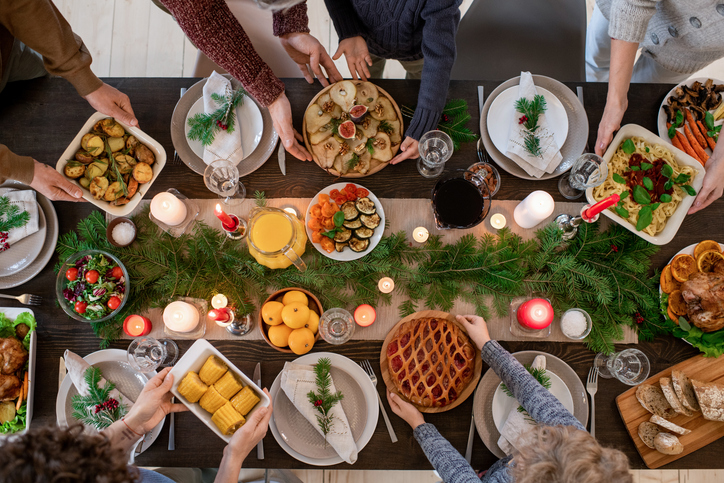As the holidays approach, our schedules fill with family gatherings, celebrations, and traditions that bring loved ones together. For families dealing with grief or with a member who has hearing loss or is living with dementia, a few extra considerations can help support a holiday filled with cherished memories. Here are some practical tips to create a joyful, inclusive environment for everyone.
1. Simplify Traditions and Decor
Holiday traditions are often treasured, especially by aging seniors, and serve as beautiful moments to connect generations. However, choosing a few key traditions can prevent overwhelming a loved one with dementia.
2. Be Mindful of Trip Hazards
Opt for simpler decorations that leave pathways unobstructed to avoid disorientation or tripping hazards. Understand how much room is needed for people who use walking aids and make sure that there are clear paths to the bathroom, kitchen, dining room or anywhere else that access is needed.
Have a plan to get everyone safely in and out of the house. Stairs can be challenging for older adults, people with temporary disabilities resulting from injury or surgery and toddlers find them difficult as well. Make sure pathways and stairs are well lit, free from ice and snow and that railings are secure. Assigning someone to assist those who need a hand isn’t a bad idea, either.
3. Loud and/or Bright Environments Can Be Confusing
Bright, flashing lights or loud sounds can also be distressing for someone with dementia, so keep lighting calm and noise to a minimum.
People who have hearing loss will find conversations challenging when there is noise coming from multiple sources. I’ve been at celebrations where my iWatch signals that the noise levels are high enough to cause damage if the level is sustained resulting from lots of conversations happening all around me at the same time. Make sure people with hearing loss can participate by keeping volumes at reasonable levels. Better yet, consider setting aside a quiet room for those wishing to have one on one conversations free from surrounding distractions. Truthfully, young children could benefit from a designated quiet room where they can calm down from what is usually an overwhelming period of time so it’s a good idea for all ages.
4. Use Familiar and Safe Decorations
While holiday decor can be festive, be cautious with items like artificial fruits or candy, as a person with dementia may struggle to tell the difference between real and decorative objects. Keep snack bowls out of reach if they contain treats that may not align with your loved one’s dietary needs. Maintaining a safe, welcoming environment allows everyone to relax and enjoy.
5. Engage in Enjoyable, Familiar Activities
Involve your loved one in tasks they can enjoy and accomplish, like baking traditional treats or signing holiday cards. These activities can provide meaningful moments of connection and purpose. They can also prolong the season and give multiple people an opportunity to engage together in smaller group settings.
6. Emphasize Togetherness Over Gifts
For many seniors, memories and shared experiences hold more value than physical gifts. Gather the family to sing favorite holiday songs, enjoy familiar treats, and look through old photos. Seniors with dementia often retain long-term memories, making these experiences meaningful and engaging for them and the entire family.
7. Keep Routines Intact
Whether celebrating at home or in a care facility, maintaining your loved one’s usual schedule is essential. Structure provides comfort and reduces stress, ensuring that your time together is enjoyable and meaningful for all. Before the holiday arrives, have conversations with your family member about their preferences. Chat with the facility care staff as well and make decisions based on what’s best for your loved one. As much as you might want to have them in your home, it might be too much. The better path might be several short visits from family members.
8. Provide a Room for Rest
Part of supporting everyone’s needs is making sure that if it’s needed, a bed is available for a nap. Whether it’s a quick 20 minutes on the couch in the den or a couple of hours in a proper bed, the ability to stick to a nap routine can make a world of difference.
9. Dealing With Grief Over the Holidays
- Acknowledge your feelings: Allow yourself to feel sad, angry, or joyful, and don’t try to suppress your emotions.
- Take care of yourself: Get enough rest, eat healthy meals, and engage in activities that bring you comfort.
- Set realistic expectations: Understand that the holidays won’t make your grief go away, and be gracious with others.
- Talk to someone: Find a friend or family member who understands and can listen to you.
- Honour your loved one: Keep their memory alive by talking about them, writing in a journal, or including them in your celebrations.
- Create new traditions: If old traditions are too painful, try creating new ones that reflect your current situation.
- Do what feels right: There’s no right or wrong way to deal with grief.
- Take things one day at a time: Grief is a process that takes time, so don’t rush it.
With a few mindful adjustments, the holiday season can be a warm, joyful experience for the entire family. Remember, a slower pace and simpler celebrations often lead to the most meaningful moments.






Add Your Voice
0 Comments
Join the Discussion